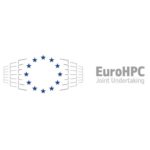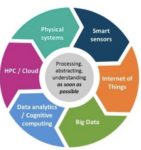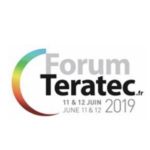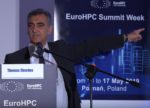Jean-Marc Denis from EPI gave this talk at the HPC User Forum. “The EuroHPC Joint Undertaking is a 1 billion Euro joint initiative between the EU and European countries to develop a World Class Supercomputing Ecosystem in Europe. EuroHPC will permit the EU and participating countries to coordinate their efforts and share resources with the objective of deploying in Europe a world-class supercomputing infrastructure and a competitive innovation ecosystem in supercomputing technologies, applications and skills.”
Podcast: ExaScale is a 4-way Competition
In this podcast, the RadioFree team discusses the 4-way competition for Exascale computing between the US, China, Japan, and Europe. “The European effort is targeting 2 pre-exa installation in the coming months, and 2 actual ExaScale installations in the 2022-2023 timeframe at least one of which will be based on European technology.”
Video: LUMI Supercomputer at CSC to run on Sustainable Energy
Today CSC in Finland announced that its datacenter in Kajaani will host a pan-European high-performance supercomputer. The machine will be about ten times more powerful than the most powerful supercomputer currently in Europe. “The investment will make CSC’s datacenter one of the world’s largest players in the field of high-performance computing,” said Kimmo Koski, Managing Director, CSC.
EU Funds Eight Pre-exascale Supercomputers
The European Union has selected eight supercomputing centers to host pre-exascale supercomputers. “In total, 19 of the 28 countries participating in the Joint Undertaking will be part of the consortia operating the centers. Together with EU funds, it represents a total budget of € 840 million. The exact funding arrangements for the new supercomputers will be reflected in hosting agreements that will be signed soon.
New Blueprint lays out Strategic Research Agenda for HPC in Europe
The European ETP4HPC initiative has published a blueprint for the new Strategic Research Agenda for High Performance Computing. “This blueprint sketches the big picture of the major trends in the deployment of HPC and HPDA methods and systems, driven by the economic and societal needs of Europe, taking into account the changes expected in the underlying technologies and the overall architecture of the expanding underlying HPC infrastructure.”
Forum Teratec to Spotlight HPC, AI, and Digital Transformation in Europe
Registration is now open for the Forum Teratec in France. The event takes place June 11-12 in Palaiseau. “The Forum Teratec is the premier international meeting for all players in HPC, Simulation, Big Data and Machine Learning (AI). It is a unique place of exchange and sharing for professionals in the sector. Come and discover the innovations that will revolutionize practices in industry and in many other fields of activity.”
The Pending Age of Exascale
In this special guest feature from Scientific Computing World, Robert Roe looks at advances in exascale computing and the impact of AI on HPC development. “There is a lot of co-development, AI and HPC are not mutually exclusive. They both need high-speed interconnects and very fast storage. It just so happens that AI functions better on GPUs. HPC has GPUs in abundance, so they mix very well.”
EuroHPC – The EU Strategy in High Performance Computing
Thomas Skordas from the European Commission gave this talk at EuroHPC Summit Week in Poland. “The EuroHPC Summit Week brings together relevant European supercomputing stakeholders and decision makers, allowing them to share on the one hand their needs and future expectations and on the other hand the latest technological developments, to define synergies and participate in shaping the future of European supercomputing.”
European Processor Initiative: The EuroHPC Industrial Cornerstone
Mario Kovač from EPI gave this talk at the Swiss HPC Conference. “EPI will provide to the European industry and research a competitive HPC platform and data processing solutions at world class level in the best interest of data security and ownership. Thanks to such new European technologies, European scientists and industry will be able to access exceptional levels of energy-efficient computing performance. This will benefit Europe’s scientific leadership, industrial competitiveness, engineering skills and know-how and the society as whole.”













